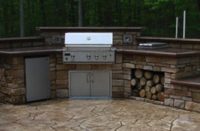
Concrete countertops are countertops. They just happen to be made out of concrete.
This should affect your marketing and selling techniques. If you understand how countertops are most commonly and most effectively marketed and sold, you will be much more successful at marketing and selling concrete countertops.
This is not to say that the fact that concrete countertops are made from concrete is unimportant. Concrete is what makes concrete countertops so beautiful, versatile and unique. It also makes concrete countertops high-end, as they are custom-made from scratch for each client. But these properties are merely features of these particular countertops. General countertop marketing principles still apply.
High-end countertops are most commonly used in kitchen and bath remodeling projects, or in truly custom new homes. Large developments of cookie-cutter or semicustom homes are unlikely to use high-end countertops, since they want to use something cheap, fast and with broad appeal.
Knowing this, think about how homeowners buy high-end countertops. They don’t buy them from a large builder like Centex. They don’t buy them at Home Depot. They seek out the countertop maker themselves, or they use an interior designer or kitchen designer to help them.
When seeking out a countertop maker, high-end countertop buyers use the Internet to search. They do not use the phone book, except perhaps to find a plumber in an emergency. A Web site is one of the most important marketing tools in your arsenal. It can serve as an electronic brochure, portfolio and information source. It lends credibility and professionalism to your company. And it can generate leads for you — if people can find it.
If you simply create a Web site, nobody will find it in the search engines. Just creating a Web site is like sticking a little sign in your front yard — hardly anyone will see it. However, using a contractor listing service is like having a billboard on a superhighway. The purpose of a listing service is to drive traffic to your Web site.
A good Web site for high-end countertops needs only a few pages: a home page, a contact page, an “About Us” page, a portfolio page, and a product information page. The product information page is particularly important with concrete countertops, since there is so much misunderstanding and lack of knowledge about the material. Your product information page can answer common questions such as “Does concrete stain?” and “Will it crack?” and therefore pre-qualify your leads.

A Web site is essential, but it’s a passive, impersonal form of marketing. So are print ads. I do not recommend print ads for startup concrete countertop businesses because they are so expensive in comparison to their rate of return. You will have many ad sales representatives trying to sell you print ads by saying, “One job per month could pay for the monthly cost of the ad.” Your response to that should be, “Yes, but I can spend a lot less on more effective forms of marketing to get that same project.”
To be truly effective at marketing concrete countertops, you need relationship marketing. Relationship marketing is the art of networking with the influencers who will help you sell more product. In the case of concrete countertops, kitchen designers are the most powerful influencers.
Think about it. How many friends and family do you know right now who are remodeling their kitchens? None? One? Five? So if someone had made a beautiful concrete countertop for you and you wanted to give them a glowing referral, you would have maybe one to five people to refer them to. How many people do you think a kitchen designer knows who are currently remodeling their kitchens? Probably 50 or more. So who is the better source of referrals?
Let’s back up and talk a little about what a kitchen and bath designer is. A kitchen and bath designer is an educated professional who understands how to combine all of the elements of a kitchen or bathroom for a workable, livable space. (As shorthand, I generally use the term “kitchen designer,” but most of these professionals also design bathrooms.) Kitchen designers understand cabinets, countertops, sinks, faucets, appliances, floor finishes, lighting, tile and other design elements. They are like general contractors for the kitchen, and in fact some kitchen designers are actual general contractors.
Kitchen designers have showrooms where they display the cabinet, countertop, fixture and appliance brands they carry in appealing vignettes to help the customer make selections. They also keep a library of samples.
The ultimate goal is to get your concrete countertops displayed in the high-end kitchen and bath showrooms in your area, creating a virtual sales force for your product. But before you can do that, you need to develop relationships with these professionals. Kitchen designers need to have confidence in you and your product, to know that you are going to do a good job for their clients.
If you are just starting out in the countertop business, the prospect of getting displays in these fancy showrooms may seem daunting. But it all starts with a simple phone call, with the modest goal of getting an appointment. Kitchen designers want to keep up to date on all the latest products. They will be happy to receive a phone call simply introducing your company and asking if you can show them some samples. Usually they will agree to a quick meeting, but if not they will likely agree to let you drop off some samples and a brochure.
When you get a meeting with a kitchen designer, the goal is just to make a good impression, leave samples, and educate. If the outcome of the meeting is that they are confident in you and your product, they will agree to keep the samples and show them to clients who might be good candidates for concrete countertops.
Once you’ve done a good job on a few projects with a kitchen designer, he or she may want you to install a display in their showroom if they have space. Be aware, though, that even if you leave samples or install a display, kitchen designers will not actively sell concrete countertops unless they understand them. In larger kitchen and bath showrooms, there are often multiple designers who work for a vice president of sales. You may have convinced the vice president of sales to put a large, prominent display in the showroom, but if the individual designers are not educated about concrete countertops, they will steer customers away. Make sure that you educate all the designers, and check in at least once per quarter to see whether there are any new designers and to give them samples of new colors, new edge styles or updated brochures. Maintain the relationship.
There are lots of other ways to develop and maintain relationships with kitchen and bath designers, as well as other design professionals such as interior designers and architects. You can network at meetings held by the National Kitchen & Bath Association or the American Society of Interior Designers, have a grand opening of your shop, present to architects at lunch-and-learns, and so on. The same principles apply: Find the influencers, network with them to develop a relationship, and educate them so that they will feel confident in you and your product.















